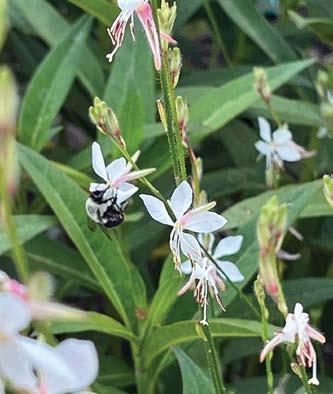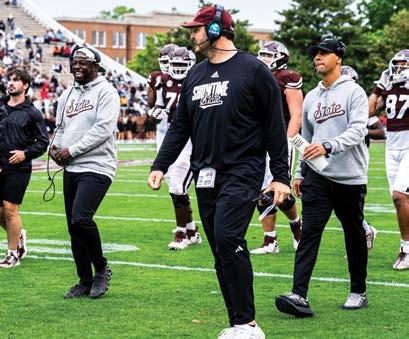










COLLEGE FOOTBALL PREVIEW

WHEELCHAIR ATHLETES


GO SIMPLE WITH RICE BOWLS

















Plan to go to the polls! REGISTER. You have the POWER to BE INFORMED. You have the POWER to VOTE. You have the POWER to VOTE MS Co-ops










REGISTER. BE INFORMED VOTE.















COLLEGE FOOTBALL PREVIEW

WHEELCHAIR ATHLETES


GO SIMPLE WITH RICE BOWLS

















Plan to go to the polls! REGISTER. You have the POWER to BE INFORMED. You have the POWER to VOTE. You have the POWER to VOTE MS Co-ops










REGISTER. BE INFORMED VOTE.



Our August 2024 issue is a special one.
The magazine you are holding in your hand (or reading on your phone or computer) is Today in Mississippi’s first Sports issue.
The theme is on purpose, and the timing is perfect since August is the beginning of football season.
Mississippians love their Friday night lights and Saturday tailgating.
In my view, sports and competition are crucial to our lives beyond entertainment. Sports promotes work toward goals, working as a team, and fostering a sense of achievement.
Sports is also something that brings us together during a time when our country’s political divisions seem to push us away from one another further and further.
To kick o our inaugural Sports issue, we tapped the most celebrated and awarded sportswriter in Mississippi — Rick Cleveland — to interview a true home state legend.
Archie Manning is one of the most popular athletes in our state’s history.
Most of us know the stories behind his prowess on the football field at Ole Miss and with the New Orleans Saints.
For our cover feature, Archie talked to us about growing up in smalltown, rural Mississippi. The Drew native’s story is something many of us can recognize and identify with, either personally, or via family and friends.
The issue also features a college football preview by our sports columnist, Dale McKee, as well as a story about the state’s youth wheelchair basketball team.
We know many of our members love sports.
We sure hope you love the August issue as well.

by Michael Callahan
Executive Vice President/CEO Electric Cooperatives of Mississippi












Send us photos of your front porches. You and your family or friends can be on them, or just shoot us photos of your front porch solo. The photos must be highresolution JPG files of at least 1 MB in size. Please attach the photo to your email and send it to news@ecm.coop. Each entry must be accompanied by photographer’s name, address, and co-op.
SUBMISSION DEADLINE: Aug. 30. Select photos will appear in the October 2024 issue.







Pickerel:
Mississippi
The Official Publication of the Electric Cooperatives of Mississippi
Vol. 77 No. 8
OFFICERS
Ron Barnes - President
Brian Hughey - First Vice President
Brian Long - Secretary/Treasurer
Michael Callahan - Executive Vice President/CEO
EDITORIAL STAFF
Lydia Walters - VP, Communications
Steven Ward - Editor
Chad Calcote - Creative Director
Kevin Wood - Graphic Designer
Alan Burnitt - Graphic Designer
Courtney Warren - Graphic Designer
Chris Alexander - Member Services Coordinator
Andy Tuccio - Media Solutions Director
Steve Temple - Social Media Director
Kendle Dean - Administrative Assistant
EDITORIAL OFFICE & ADVERTISING
601-605-8600
Acceptance of advertising by Today in Mississippi does not imply endorsement of the advertised product or services by the publisher or Mississippi’s electric power associations. Product satisfaction and delivery responsibility lie solely with the advertiser.
• National advertising representative: American MainStreet Publications, 800-626-1181
Circulation of this issue: 466,375
Non-member subscription price: $9.50 per year.
Today in Mississippi (ISSN 1052-2433) is published 12 times a year by Electric Cooperatives of Mississippi Inc., P.O. Box 3300, Ridgeland, MS 39158-3300, or 665 Highland Colony Parkway, Ridgeland, MS 39157. Phone 601-605-8600. Periodical postage paid at Ridgeland, MS, and additional o ce. The publisher (and/or its agent) reserves the right to refuse or edit all advertising. The magazine is published for members of subscribing co-ops. The magazine is a bene t of membership.
POSTMASTER: Send all UAA to CFS. (See DMM 507.1.5.2) NON-POSTAL AND MILITARY FACILITIES: send address corrections to: Today in Mississippi, P.O. Box 3300, Ridgeland, MS 39158-3300

www.facebook.com/TodayinMississippi
www.todayinmississippi.com

Ole Miss and Saints
Archie

NRECA has joined with other member cooperatives to urge a federal appeals court to halt implementation of the Environmental Protection Agency’s new mercury and air rule before it can cause “substantial, irreparable, and immediate harm” to electric co-ops.
If the rule is not paused, co-ops will su er “exorbitant” costs to bring their power plants into compliance with standards that may later be deemed unlawful, according to a motion for a stay of the final rule that NRECA and others filed in June with the U.S. District Court of Appeals for the D.C. Circuit.
Co-ops would never be able to get that money back, even if the rule is later thrown out by a court amid legal challenges to the EPA’s authority, the motion says. If the court grants NRECA’s request for a stay, the rule would be put on hold until the courts can evaluate its legality.
It’s also questionable whether the new standards are even achievable, according to NRECA and other petitioners. NRECA has urged the EPA
to rescind the new mercury rule — which has “no appreciable public health benefits” — and keep the previous standards in place.
The new rule requires plants burning lignite coal to slash their mercury emissions by 70% compared to EPA’s 2012 standard. The chemical di erences in lignite prevent emissions controls from achieving the same level of reductions as in other types of coal, NRECA says.
The rule — which plant operators must comply with by July 2027 — also requires a 67% cut in filterable particulate matter for all coal-fired plants but does not identify any new cost-e ective technologies to meet that goal.
If the standards can’t be met, power plants would be forced to shut down, which NRECA warns would threaten reliability at a time when demand for electricity is growing.
“The premature shutdown of plants will cause electricity costs to skyrocket,” the stay request warns. “Without generation, utilities must purchase power at unsustainable prices to meet demand.” – NRECA
Proposed regulations for reporting cybersecurity incidents impacting critical infrastructure go beyond what Congress intended and should be re-drafted to be less of a burden for electric cooperatives, the NRECA told the Department of Homeland Security.
The NRECA filed comments July 3 to the DHS Cybersecurity and Infrastructure Security Agency (CISA) calling its proposal to carry out the Cyber Incident Reporting for Critical Infrastructure Act (CIRCIA) counterproductive for electric co-ops’ cyber e orts.
“NRECA supports CISA’s goal of improving the nation’s cybersecurity posture, but the agency needs to adhere to congressional intent and avoid requirements that are overly broad and will strain our cyber workforce,” said John Ransom, NRECA director for cybersecurity regulatory a airs.
NRECA asked the agency to raise its threshold for reporting a cyber incident to include only incidents that impact operations. It also asked the agency to take a risk-based approach to identifying entities rather than expanding authority over a wide number of utilities.
“Requiring all electric utilities to report incidents exceeds Congress’s intent and would create significant new costs for cooperatives and the communities they serve,” Ransom said. “Further, this proposal has the potential to increase cyber risk to cooperatives by stretching their cyber resources to focus on compliance activities rather than incident response.”
A final rule to implement CIRCIA is due in 2025. – NRECA

















One of my favorite gardening experiences is seeing plants spontaneously appear in various spots in my home garden and landscape.
I love these plant volunteers, and I let them flourish in unexpected places around my garden. Their surprise appearances make the garden feel alive and ever-changing.
I once wrote about a vinca whose tiny volunteer seedlings emerged from a crack in my greenhouse floor, sprouting from seeds left by last year’s plants. These little surprises, with their vibrant red and pink blooms, made quite an impression with their tenacious growth and cheerful flowering.
I often find vincas growing in crevices and along pathways, their bright flowers adding a pop of color to the otherwise dull spaces. Their ability to thrive in less-than-ideal conditions makes them a welcome addition, and I look forward to seeing where they will appear next.
Another volunteer plant that brings joy to my garden is coleus.



Known for their striking, colorful foliage, coleus plants have a way of appearing in unexpected places, adding vibrant splashes of red, purple, green and yellow to the landscape. Their large, velvety leaves come in a variety of patterns, from bold stripes to delicate veining, making each coleus unique.
I enjoy their surprise appearance, as their bold hues and intricate leaf designs enhance my garden’s overall aesthetic. They transform ordinary corners into stunning displays of natural art.
One of the most delightful volunteer plants in my garden is the gaura.
These graceful plants have airy sprays of delicate white and pink flowers and a knack for popping up in the most unexpected places. Their slender stems and butterfly-like blooms add a whimsical touch to the landscape.
I often find gaura nestled among other plants or even in the cracks of walkways. Their delicate beauty adds elegance and movement to the garden, as their flowers sway gently in the breeze.

During a recent scouting trip for Southern Gardening, I spotted some begonias growing out of cracks in a concrete and brick stairway. The previous year, begonias grew in a container on the stairway, and the seeds fell into cracks in the bricks and concrete.
These begonias, with their vibrant green leaves and bright white flowers, turned an ordinary stairway into a miniature garden oasis, demonstrating the resilience and beauty of nature.
What’s fascinating about all of these flowering volunteers is that they often di er from their parent plants. This is because most flowering annuals from garden centers are hybrids, bred for specific colors, growth habits and other traits.
One of my favorite gardening experiences is seeing plants spontaneously appear in various spots in my home garden and landscape. I love these plant volunteers, and I let them flourish in unexpected places around my garden.
When hybrid plants are pollinated, it’s like rolling genetic dice. The result is seedlings that frequently display a variety of traits, reflecting the genetic diversity of their breeding history. This genetic variation makes each volunteer plant unique.
Watching these volunteers develop and reveal their distinct characteristics is like uncovering a hidden treasure, each one an extraordinary masterpiece.
One important thing to know about volunteer plants is that they primarily spread via seeds.
I always allow a portion of the flowering plants in my garden to go to seed. I collect and scatter these seeds or simply let nature and the wind distribute them. This natural propagation method ensures a continuous supply of delightful surprises throughout the garden.










by Dr. Eddie Smith
Southern Gardening columnist Dr. Eddie Smith, a gardening specialist and Pearl River County coordinator with the Mississippi State University Extension Service, is an internationally certified arborist, Produce Safety Alliance certified trainer, and one of the developers of the Mississippi Smart Landscapes program that encourages the use of native plants in the landscape.
























Chain pickerel go by many names. Mississippians also call them pike, duckbilled pike, or jackfish. Whatever the name, these vicious, toothy predators can provide exciting, hard-hitting sport on light tackle.
Most pickerel run about one to three pounds, but they can weigh more than nine pounds. Ronnie Boren caught the Mississippi state record, a 6.25-pounder, while fishing Bay Springs Lake near Tishomingo. Built for speed, elongated pickerel can reach lengths of more than 30 inches.
A member of the pike family with northern pike and muskellunge, or muskie, chain pickerel thrive throughout the Magnolia State. They prefer placid weedy waters where they can use their excellent
camouflaged coloration to ambush prey. Pickerel hide in thick vegetation waiting for unsuspecting creatures to venture too close. When they see something tempting, the water wolves slash out with amazing quickness to seize prey with their sharp dental equipment.
Sight feeders, pickerel primarily feed upon threadfin shad, sunfish, shiners, minnows and other small fish, although these opportunistic freshwater barracuda might gulp anything that fits into their large mouths. Other prey species could include crawfish, small amphibians and reptiles, even small mammals or birds if they can catch them. Sometimes, pickerel grab dragonflies perched on grass stems or leap from the water to snatch low-flying insects from the air.


Chain pickerel go by many names. Mississippians also call them pike, duckbilled pike, or jackfish. Whatever the name, these vicious, toothy predators can provide exciting, hard-hitting sport on light tackle.
Although abundant and widespread, pickerel receive very little fishing pressure in Mississippi. Most anglers try to avoid them, but commonly catch the toothy killers by accident while fishing for largemouth bass or crappie. A pickerel might hit almost any lure or bait that would entice a largemouth bass, much to the chagrin of most bass enthusiasts. Some proven pickerel lures include spinnerbaits, crankbaits, spoons, and other artificial temptations that resemble or mimic baitfish. They will relentlessly pursue soft-plastic weedless frogs buzzed across matted grass. Pickerel occasionally brutally attack topwater temptations.

When hooked, pickerel put up a spirited fight with fast runs and powerful lunges. They sometimes even leap from the water like bass. People intentionally fishing for these predators should use short steel leaders to prevent their razor-like teeth from slicing through fishing line.
Large chain pickerel make excellent eating, but the long, skinny snake-like fish don’t yield much meat. Most people release them because of their numerous small “Y” bones, but the white, flaky flesh tastes delicious with a mild flavor and no oily taste.
Mississippi anglers might also catch two other species. A redfin pickerel looks similar to a chain pickerel but with distinctive red fins. Particularly common in the Pascagoula River system, redfins rarely surpass one pound but can exceed two pounds. A grass pickerel tops out at about one pound. Both species favor sluggish ponds and lakes with extensive vegetation.
Handle all pickerel with care. When grabbed, the incredibly agile beasts frequently bend their bodies and shake their heads violently looking for something to bite. If they don’t bite a person, they might drive a hook into a finger. Also pay attention to the very sharp gill plates that can slice flesh.

by John N. Felsher
wide variety of outdoors topics. Contact him at j.felsher@hotmail.com.


‘See the athlete, not the chair’
by Steven Ward
A former Gluckstadt family started a wheelchair youth basketball team in 2013 that started off with six athletes and a second-place trophy from their first basketball tournament in North Carolina.
That team morphed into the nonprofit Mississippi Youth Wheelchair League — MYWheeLs for short — in 2014. The goal of MYWheeLs then and today remains the same — to provide wheelchair sports opportunities at little or no cost to Mississippi families.
The family, Lisa and Dave Elliston, moved from Nashville to Mississippi in 2013 and were looking for a youth wheelchair basketball team for their then 12-year-old son, Jonathan.
Jonathan, who was born with the rare bone condition, polystotic fibrous dyplasia, had been playing wheelchair basketball in Nashville since he was 8.
“I found an adult wheelchair basketball team in Jackson. After reaching out to them, Jonathan was invited to come to practice
with them at Jackson State University. Because he was not 18, he could not join the adult team,” Lisa Elliston said. She said others had tried to form a youth team in the Jackson metro area, but no one had any luck.
That’s when Lisa and Dave decided to go all in and do it themselves.
“Following a grassroots promotion to reach out to children with a lower limb disability and an invitation to all the sports reporters at the local television stations, our first “Basketball Fun Day” took place at JSU,” Lisa Elliston said.
Over the summer months, Lisa secured an “In-kind sponsorship” with the Baptist Healthplex in Clinton for a practice facility. Her husband took on the challenge of naming the team, coming up with team colors, and a logo, and was their first head coach. That’s when the Mississippi WheelCats were born.
The team joined the National Wheelchair Basketball Association and the group’s Southeastern Conference where the WheelCats competed against teams from Birmingham, Alabama, Nashville, Atlanta, and Raleigh and Charlotte, North Carolina.
The Ellistons decided that no family should have to pay to play. That first season, with the help of the MACE Foundation, the families raised money and had access to grant money to assist with funding for travel, hotel rooms, and tournament costs.
Through sponsorships, grants, and donations, the WheelCats have been able to continue the league and teams each year.
MYWheeLs needs about $90,000 to run a successful year for three teams. That money funds different camps to send athletes and families to, insurance, a storage facility, websites, and NWBA fees. To help financially and make donations, readers should reach out to Chief Financial Officer Mark Roth at 769-232-7510 or email him at mcroth5@yahoo.com.
Lisa Elliston said families from all around Mississippi who participate are grateful that the WheelCats exist.
“The two stories that really brought Dave and I to our knees, were two children from two different families under 10 that wished they weren’t born; vocabulary that children shouldn’t have in their heads,” Lisa Elliston said.
“One was barely five years old when mom brought him to his first practice to try it out. That mom told us that this sport changed him forever. He couldn’t wait to come to practice again, smiled so much more, and didn’t want mom to push him in his day chair anymore. The family moved out of state, but he continues to play wheelchair basketball at 15 years old.”
One was barely five years old when mom brought him to his first practice to try it out. That mom told us that this sport changed him forever. He couldn’t wait to come to practice again, smiled so much more, and didn’t want mom to push him in his day chair anymore.
The Mississippi WheelCats youth team has grown to include a varsity team as well as a team for high school seniors, The Mississippi ThunderCats.
Six WheelCat graduates have gone on to play collegiate wheelchair basketball. Recruitment is the same as in the NCAA for able-bodied sports. These six players were recruited by Southwest Minnesota State University, the University of Illinois Champagne/ Urbana, and the University of Alabama.
The Mississippi Youth Wheelchair League also features other competitive adaptive sports, including swimming, para karate, archery, para shooting, tennis, and fencing.
The other story, she said, involved a nine-year-old boy who hated using a wheelchair.
“When he joined the WheelCats and saw the other kids in wheelchairs, he couldn’t wait to get his very own sports wheelchair to play. Ten years later he received a college scholarship to play wheelchair basketball.”
Parents have their own reactions.
“The very first time a child gets into a sports chair with a basketball in their lap and held with their chin, rolling down the court; the parent almost always cries tears of joy. When the child doesn’t want mommy or daddy to push them in their day chair any more is another huge moment for parents. They never thought they would see that independence in their child,” Lisa Elliston said.
For more information about the Mississippi WheelCats, visit www.mywheels.org or call 601-985-8712.















by Susan M. Collins-Smith
The consequences of last year’s significant drought continue to appear in trees all over Mississippi.
Landowners in Central Mississippi have recently reported damage from variable oakleaf caterpillars and hypoxylon canker, according to the Mississippi Forestry Commission.
The combination of the caterpillars and hypoxylon canker has been observed a ecting trees in towns including Raymond, Flora, and Pocahantas. Variable oakleaf caterpillars favor oak trees but will also feed on other hardwood species. Hypoxylon canker is a fungus that can reduce growth and in severe cases kill trees. The fungus is always present in the environment and is spread by wind.
For drought-stressed trees, the double whammy can be a serious threat, but healthy trees will be able to withstand both pests, said Brady Self, a forestry specialist with the Mississippi State University Extension Service.
“In normal years, neither hypoxylon canker nor variable oakleaf caterpillar result in significant amounts of tree damage or mortality,” Self said. “However, last year’s drought added a stressor that both pests may exploit, and it is possible that the two may work in conjunction with one another causing a greater incidence of damage and mortality.
help distinguish them from other caterpillars. However, they can be confused with the double-lined prominent caterpillar, which looks similar and is in the same genus.
Kristy McAndrew, Extension forest health specialist, said variable oakleaf caterpillars can completely defoliate trees in some instances, especially older caterpillars, which leave only the very strong or thick veins of the leaf behind.
Mississippi typically gets two generations of this caterpillar in the state. One can be present as early as May. The second generation occurs in late summer and sometimes into fall near the Gulf Coast.
Last year’s drought added a stressor that both pests may exploit, and it is possible that the two may work in conjunction with one another causing a greater incidence of damage and mortality.
“Obviously, due to weather and various environmental factors, no one can predict the total amount of damage we may see this year,” he added. “But with proper monitoring and aid, residents can help relieve stress levels of infected or infested trees as the summer progresses by watering and avoiding soil compaction, mechanical injury or unintended exposure to herbicides.”
Self also noted that the caterpillars and fungus are not linked by anything other than their propensity to take advantage of stressed trees.
True to their name, variable oakleaf caterpillars vary in color. The dark markings, which look like sideburns, on the sides of the head can
“Based on insect museum records and reports from naturalist sites like iNaturalist, this caterpillar is slightly more common in the central and southern parts of the state, so populations being higher in Central Mississippi could simply be because this insect is more common in the region,”
McAndrew said.
Drought leaves trees with a compromised ability to defend themselves against any kind of trauma, including damage from insects and disease.
“While virtually all of Mississippi experienced drought last year, the southern half of the state, especially the central and southwestern portion, seemed to get hit with the most severe drought,” McAndrew said. “With that in mind, the trees in this region were more drought-stressed relative to other regions in the state and therefore more predisposed to damage by variable oakleaf caterpillar.”
Mississippi may see another generation of this oakleaf caterpillar species later this summer and fall, but usually, only one generation contributes to an outbreak in the same year. But landowners and homeowners should be on the lookout for large numbers of these caterpillars next summer, McAndrew said.



“Now Jack can control the volume on his TV•Ears while I set the TV volume or mute it for complete quiet. Once again, he can understand every word and we can watch our favorite TV shows together.”
— Darlene & Jack B., CA A Better Way to hearTV®

Doctor recommended TV•Ears has helped millions of people with hearing loss enjoy their favorite television shows, movies and streaming content without disturbing others.
The Voice Clarifying Technology® reduces background noise and clarifies hard to hear television dialog making voices and words understandable. 120db of volume makes TV•Ears the most powerful television listening system on the market!
Quiet TV mode lets others mute the television or set the volume to their preferred level while you listen as loud as you want on the headset.

















Whether you are exploring the coast or a local looking for a little get away, our new campground is the ideal place to stay. There’s plenty to do for all ages with pickleball, an adult pool, lazy river, hot tub, playground, doggie park, horseshoes, spa chair and more! And don’t forget to bring your pets along!
We offer premium tent sites with water and electric, 4 deluxe cabins with full baths, 4 cottages with 1/2 baths, rental campers, 8 sites with k9 playyaros, golf cart rentals, and a pavilion. All sites are equipped for 30 and 50 amp with full hookups, as well as have a firepit and patio, most also have grills. 3 Private showers and 2 bath houses.
Weekly, monthly, and holiday events
We are conveniently located 4 miles north of 1-10, just minutes from beaches, casinos, shopping, and many local attractions. Come see what all the buzz is about! 14031 Hwy 49N Gulfport, MS 39503












“Improving the quality of life for all those we touch.”
If you’re like me, there are aspects of your life that become sort of a daily routine. I get ready for work, get in my car and drive to the co ee shop on the way to the o ce. At lunchtime, I sometimes make my way to an area restaurant. Once I finally end the day at home, I spend time with the family, stream an episode or two of my favorite show and head to bed.
As we all look for ways to save money in this age of increasing inflation, I began to think about my daily routine and how much value it provided me compared to the money I spent. A morning co ee and donut break was costing me about $6; a fast-food combo with a burger, fries and a drink was setting me back $10, and my streaming subscription is about $16 each month. All these daily expenses totaled around $85 a week, or about $340 monthly. And what was the real value — short-term satisfaction and a larger waistline? Even as I started packing my own lunch, my co ee/donut breaks were still costing me about $120 a month. This got me thinking — is this the best value for my money?
The average daily cost of electricity is about $4.57, and the average monthly electric bill for members of 4-County is about $140. You could power your entire home every day for the price of a medium co ee. I could brew my own co ee, cook my own meals, binge a series and run on a treadmill for less than the cost of that drink. Now to me, that’s real value.
Electricity provides benefits that we often take for granted. It goes well beyond short-term satisfaction by allowing us to charge devices and have cold food and hot water, all in a comfortable indoor climate. Besides the privilege it a ords, electricity has also remained relatively cost-stable even amidst rising inflation.
As a member-owned cooperative, 4-County does everything in our power to ensure your costs stay reasonable and that electricity remains a great value for our members. It’s not always easy, as there are several factors beyond inflation that impact the price of electricity — some within our control but most beyond it.
The cost of electricity can fluctuate due to supply and demand, infrastructure investment, maintenance and operational expenses. Weather patterns also contribute, a ecting both demand and generation capabilities, with extreme conditions leading to heightened energy use or disruptions. Government policies, such as subsidies for renewable energy or taxes and regulations on emissions, shape electricity costs as well. Your electric co-op considers all these aspects when adjusting rates, and because we’re a cooperative, we consider the impact of those costs on our members as well (see sidebar below for more information).
As our community continues to rely on electricity for nearly everything in our homes, schools, hospitals and businesses, we need it to be reliable and a ordable. You can be assured, 4-County always puts you top of mind and works each day to ensure electricity remains the best value for your money.

by Brian Clark
CEO/General Manager
As costs of purchasing power rise along with other essential elements of doing business as an electric cooperative, 4-County Electric Power Association rates will likely undergo an adjustment later this year.
4-County o cials say that while the Association has been able to successfully avoid a significant rate adjustment over the past decade, the time may have finally come. Again, costs for doing business continue to rise. Basic items like poles, wire and transformers are extremely expensive right now. The cost to replace a bucket truck is staggering.
With that said, 4-County will continue to work daily on keeping your rates as low as possible. What can you do? Take a look at the cost-saving adjustments here:



In addition to increased comfort, weatherizing your home is an excellent way to save energy and lower your cooling and heating costs. Here are three ways you can seal in comfort and savings.

































4-County Electric Power Association delegates Maggie Martin, Gaby Baumbach, Tyler Phillips and Liv Gundy recently joined a group of 81 rising high school seniors from across Mississippi at the 2024 NRECA Youth Tour in Washington, D.C.
The June 15-21 trip was the culmination of the students’ participation in the Electric Cooperatives of Mississippi’s youth leadership program.
Learn, grow, experience. That’s what the Cooperative Youth Leaders program is all about. EXPERIENCE is the third component in the program. Our Mississippi students experienced all facets of their nation’s capital city.
They joined nearly 1,700 student leaders from 44 states for the 2024 National Rural Electric Cooperative Association’s Youth Tour. The program, which instills leadership skills, inspires creative thinking, builds confidence in decision-making, and introduces students to lawmakers that represent their communities.

the students met and spoke with their U.S. senators — Roger Wicker and Cindy Hyde-Smith.
While in Washington, D.C., the students and adult chaperones visited historic sites, monuments, museums, and had an opportunity to learn about the impact electric cooperatives have on their communities.
The students also had an opportunity to tour the U.S. Capitol, sit on the floor of the House of Representatives, and visit the Library of Congress as guests of former U.S. Congressman Gregg Harper of Mississippi.
The students attended a Washington Nationals pro baseball game and had dinner during an evening cruise on the Potomac River.
The students were chosen in the fall of their junior year of high school through interviews, where they LEARNed about their electric cooperative and the electric power industry.




During a March workshop in Jackson, which is the GROW component of the program, the students had the opportunity to meet and hear from state legislators. During the trip to Washington, D.C.,


The Cooperative Youth Leaders program is fully funded — including the trip to D.C. — by the local electric co-ops as a commitment to molding future leaders for Mississippi, so they can impact the state and local communities.








Our favorite part of the Youth Tour was the connections we made with other students from not just our state, but from around our country. – Maggie Martin, Tyler Phillips, Liv Gundy, and Gaby Baumbach

GABY BAUMBACH
HERITAGE ACADEMY
LIV GUNDY
FRENCH CAMP ACADEMY
MAGGIE MARTIN
STARKVILLE ACADEMY
TYLER PHILLIPS
COLUMBUS CHRISTIAN ACADEMY
























































“I love old mystery television shows like ‘Murder She Wrote’ and ‘Columbo’ – entertainment from the 1970s and 1980s. I’m just an old soul,” Marquetta said.
The 4-County/FASTnet member service representative enjoys watching her favorite shows while eating home-cooked meals. “I love to cook soul food: candied yams, macaroni and cheese, greens and fried chicken. I particularly like fresh vegetables right out of the garden,” she stressed.
Clark is a self-described “country girl” that grew up in Oktibbeha County working and playing with her siblings and cousins. “We jumped on hay bales and learned how to drive tractors at an early age. We worked hard and played hard. I was always the one to get the fun started,” she said.
That raised-in-the-country work ethic has served her well at 4-County/FASTnet. “I want to make our members and customers smile. It’s important to be empathetic, have the right information and give them some light at the end of the tunnel. That makes them happy, and that makes me happy,” Marquetta said.
She joined 4-County/FASTnet in November 2022. Prior to 4-County, she worked three years for Impression Solutions as an account representative. She attended East Mississippi Community College.
Marquetta and her husband, Rodrigues, live in Starkville. Marquetta has one son, Delontae Hatchett, three stepdaughters, and four stepsons. She also has one grandson. She and her family attend Mount Olive Missionary Baptist Church in Starkville. “I love my family and my church family.”
Known as the snack lady in her neighborhood, Marquetta is a favorite among the local kids on the block. “I spoil them. They come see me every day for freeze pops. I open the door with a smile,” she said.
That willingness to serve extends to her place of business. She describes her relationship with her immediate co-workers as a sisterhood. “We bond, connect, and support each other.”
Marquetta says 4-County/FASTnet as a place she can grow — a real home away from home. “It’s a great place to work. We provide a valuable service to our customers, and I appreciate our volunteer e orts in the communities we serve.”





I’ve learned a lot of things over the years, talking to all sorts of experts in all sorts of fields. But one of the most important lessons I learned was from two former Directors of the U.S. Mint, who taught me everything I needed to know about the importance of protecting my savings with physical gold and silver.
In 25 years of working dirty jobs, the thought of a diversified portfolio really didn’t cross my mind—but the more I learn, the better I feel about buying gold and silver from U.S. Money Reserve.
Is gold right for you? That’s not for me to say. You’ve got to do your own due diligence. All I know is that today, it’s not enough to simply work hard—you also have to save smart. So, visit the link or call the number below. The folks at U.S. Money Reserve are standing by to help.











Follow Mike Rowe on his gold ownership journey: Call now for access to the all-new video series and your




Learn everything you need to know about gold!




Answers to commonly asked questions about gold ownership
Information on how gold can protect and grow your savings
Access to special introductory o ers
Two additional exclusive reports: “2024 Global Gold Forecast” and “Protection in the Risk Zone”




by Rick Cleveland


Someone, someday, should write a book or shoot a documentary about how small-town Mississippi has shaped so many of our state’s most treasured icons – people such as William Faulkner from New Albany, Morgan Freeman from Charleston, William Winter from Grenada, Willie Morris from Yazoo City, Medgar Evers from Decatur, and Leontyne Price and Ralph Boston from Laurel.
The tiny Sunflower County town of Drew spawned and nurtured the most popular and beloved athlete in Mississippi history, Archie Manning. At the close of the 20th century the Clarion Ledger, then Mississippi’s largest newspaper, conducted a poll to determine the state’s greatest athlete of the previous 100 years.
It wasn’t a scientific poll, but it was telling, and thousands upon thousands participated. The winner, with approximately 70% of the


vote? Ole Miss and New Orleans Saints QB Archie Manning. It wasn’t close.
This is a state that had produced Jerry Rice and Walter Payton in football, that has produced three-time Olympic medalist Ralph Boston in track and field and so many other splendid world-class athletes. Just one guy got 70% of the votes, nearly 30 years after he moved away from the state.
There’s an old African proverb – “it takes a village to raise a child.” For Elisha Archibald Manning III – skinny, red-haired, and freckled as a child – that village was Drew, slap dab in the middle of the Mississippi Delta. Manning will tell you Drew molded who he is and rallied around him when he lost his father, tragically, as a 20-year-old.
“Drew was a little bitty place much like Andy Gri th’s Mayberry. For me, Drew was perfect,” Manning said during an interview at his New Orleans condo in June. “You literally could walk all over town. As kids, we did. Back then, Drew had four tra c lights including the one out on Highway 49. But two of the three in town had only red and green lights, no yellow or no caution light. Never seen that anywhere else.”
Manning chuckled, clearly enjoying the memory, before continuing to paint the picture of his hometown.
“We had four gas stations, two drugstores, and both of those had soda fountains,” Manning said. “We had one barber shop with three barbers, one with hands that really shook. When it was your turn, you went to the first open chair. I always kinda prayed I wouldn’t get the one with the shaky hands.”

In 1950s Drew, as in much of small-town Mississippi, social life revolved around church. In Drew, the Baptist and Methodist churches were side by side. The Mannings were church-going Baptists, and Archie received a pin for his 14 years – 728 Sundays – of never missing Sunday school.
“I enjoyed it, I mean, I really liked going,” Manning said, smiling. “Now, vacation bible school, that was something else. I would much rather have been playing ball with my friends, but I did it every summer.”
When we were growing up, we didn’t do much of anything except play ball –football, basketball and baseball. Archie was really good at all of them. He was gifted, yes, but he worked at it and, man, he loved to compete.
Manning, who recently turned 75, was born on May 19, 1949. According to the 1950 census, Drew was home to 1,681 folks, including one baby boy who would become one of the most famous football players and then football fathers in America.
“We had two cafes and neither one was open past 6 or 7 in the evening, so if you wanted to eat out after that, you went to Cleveland 18 miles away,” Manning continued. “You wouldn’t believe it if you went to Drew now, but we had a Main Street that was really active. I mean, every storefront was occupied and busy. On Saturday nights, when the farmers and country folk came to town it was like Mardi Gras. It was a happening.”
“When we were growing up, we didn’t do much of anything except play ball – football, basketball and baseball. Archie was really good at all of them,” said Steve Clark of Oxford, Archie Manning’s friend since both were in diapers. “He was gifted, yes, but he worked at it and, man, he loved to compete.”
Physically, especially size- and strength-wise, Archie was a late bloomer. But when he bloomed, he was, in a word, special.
Paul Pounds, now retired and living in Columbia, moved to Drew in 1966 to become the football coach for Manning’s senior season. Pounds remembers seeing Archie for the first time in a gymnasium playing hoops. Pounds said Manning probably weighed 150 pounds at the time. And what did Pounds think?
“I thought the first thing everybody thought the first time they saw that skinny, red-headed kid,” Pounds said. “I thought: This kid is a natural. I didn’t know the half of it yet.”
He would learn. So would anybody who ever watched Archie Manning play ball.







Where Archie Manning was concerned, it really did take a village. He was the son of Elisha Archibald “Buddy” Manning, Jr. and Sis Manning. Buddy ran a farm supply business. Sis was a homemaker, and later a legal secretary. The Manning family, including older sister Pam, lived in a humble three-bedroom, two-bath home, across the street from Drew High School. As a toddler, Archie would stand in the front yard and watch the older kids play games.
“One of my earliest memories was that I could not wait to be out there, across that street, playing ball,” Manning said.
Many of the school’s faculty, sta , and coaches lived nearby. Often, the football, basketball, and baseball coaches were next-door neighbors.
“My daddy would always welcome them to the neighborhood, help them move in, cook steaks for them Saturday nights,” Archie said. “Those coaches didn’t know it yet, but they would pay for all that help. I’d pester the heck out of them to play catch or throw the football with me. When they’d go o to scout games, I’d beg to go, and they’d always take me. It was an ideal situation for me. I learned so much.”
Buddy Manning was the youngest of five Manning children who moved to Drew from Crystal Springs. They were a farming family until Buddy broke the mold and went into retail.
“I had two aunts, Mamie and Lucy, and two uncles, Peyton and Andy Frank,” Manning said. “None of the four of them ever got married. They lived on a farm out from Drew. They were farmers, not planters. They worked. My uncles were sweet guys, who loved sports. My aunt Mamie had dementia early on, and my aunt Lucy, who was outspoken and farm-girl tough, took care of Mamie and her brothers. She ran the show. She was a tough ol’ bird. None of them ever missed one of my games.”
Archie worked and played on that family farm. “They had a basketball goal, a peach basket, actually, nailed to the barn. They had balls and bats.”
Little Archie enjoyed the playing much more than he did the farming. “I remember telling my Aunt Lucy that I wasn’t going to be a farmer, that I was going to be a city boy,” Archie said. “She said, ‘Well, we’ll see about that.’”
And we have.
























Archie and sister Pam were both active in 4H Club as teens. Archie says one of the most useful life lessons he learned came from the 4H Club.
“Every summer, they had a district talent show in 4H, and Sis insisted that Pam and I participate,” Archie said. “When I asked what I should do, she said that Pam and I should sing together as we did in church. Well, I didn’t want to get up in front of all those people and sing. Nothing against Pam, I just didn’t want to sing.”
So Sis Manning suggested Archie give a speech. “As soon as she said it, I said, ‘I’m in,’” Archie said. “I asked what I should speak on, and my mother got help on that one. She wrote a letter to Paul Harvey, the famous radio personality, and asked for a suggestion.”
Harvey wrote back and suggested Manning should do his speech about his home state, Mississippi. “So that’s what I did,” Archie said. “I wrote my speech about Mississippi, and then my mother and one of her friends helped me polish it up. I gave it, and, believe it or not, I won.”
He won the next year, too, and as fate would have it, public speaking has provided Manning with millions of dollars in income over the years.
The little skinny, red-headed kid from little bitty Drew has done well.

OLE MISS
Quarterback – 1968-1970
SEC Player of the Year – 1969
1st Team All-American – 1969
College Football Hall of Fame – 1989
NEW ORLEANS SAINTS
Quarterback – 1971-1982
NFL Draft – First round pick in 1971
Pick: No. 2
Pro Bowl – 1978 and 1979
Retirement: After the 1984 season
NFL SONS
Quarterbacks Peyton Manning (University of Tennessee) and Eli Manning (Ole Miss)


































































If you're tired of having knee pain and want to talk to a doctor that can virtually give you your life back if knee pain is an issue, call Dr. Rob Acord... as he's the only doctor in the area... who has this newly discovered knee pain reduction technology.
If you have knee pain, can't walk because of an old injury, or you just think it's part of getting old, you might want to read this article.
Knee pain is something that disables a lot of people every single year, but most people don't know what to do about it.
Some people immediately opt in for surgery, then some people watch TV and end up buying something they wrap their knee with-hoping it will help, and others just follow orders and take medications which simply block the pain signals while the underlying condition often progresses.
All I'm saying is this. There are a lot of ways to TREAT your knee pain, but which one will really work?
If you've done your research, you know that there are not a lot of things that really work when it comes to actually helping align the knee, taking nerve pressure off the knee, and reducing the pain and swelling.
What if there was a "real solution" that worked from DAY ONE?
Hi, I'm Dr. Rob Acord and I'm here to tell you about a new device called the K.P.R.
I stumbled onto this one-of-a-kind machine at a recent medical conference and tried it myself. THE RESULTS: My knees have never felt so good, and that was after.... just one treatment.
It virtually reduced my knee stiffness by 95%, so I am positive it'll help your knee pain, help you walk better as soon as you get your first treatment, plus help you do some things you used to do without the help of a walker, cane, or someone else helping you

Now, don't get me wrong. I'm not guaranteeing a miracle if you haven't walked in many years.... but this just may be the answer you've been looking for.
Better late than never for sure. You should entertain this option... no matter what's happened to you in the past!
Let me be very clear; I'm here to possibly help you:
Get out of pain
Walk better
Move better
Get up and down better
Get out of chairs easier
AND...
Finally you will be able to move without relying on someone or something else
"What if my knee(s) are BONE ON BONE?"
Here's all I can tell you If you’re bone on bone, and surgery is not an option for you, or surgery didn’t work, this may be the exact treatment you’ve been needing
You'll find out that K P R is an amazing machine when teamed up with our Class IV laser therapy
Great questions and here's the answer: We have a reputation for getting great results, but if you're like most of our patients you know that the knee problem isn't going to just go away on its own. We're also known for our personalized care We don't promise the world, but we will do everything humanly possible to get the results you want.
"I've NEVER done this before!" I'm going to offer you a consultation, knee examination, X-Rays, and TRIAL VISIT for only
$47 $47
We'll know almost IMMEDIATELY if we can help and most importantly, YOU WILL TOO
As you know, it's human nature to procrastinate; this is not the time to do that... WHY?
My Trial Offer goes away at the end of this month It's available as a hard deadline because I have a limited number of trial spots and we are already an extremely busy office. Pick up the phone and call the office now This one call could change the way you walk, feel, and move CALL TODAY!
Dr. Rob Acord, D.C.





















Several major questions will be answered as we enter the 2024 college football season. Will Ole Miss become a national contender? Will Baylor transfer Blake Shapen help Je Lebby’s first season in Starkville be a success? Can Will Hall turn around the fortunes in Hattiesburg after a dismal showing in 2023?
Je Lebby comes to Starkville from Oklahoma, where he served as o ensive coordinator the past two seasons. Lebby, whose Sooners o ense last year was fourth in the country averaging over 41 points per contest, replaces the defensive minded Zach Arnett.
The first order of business for Lebby was to find a replacement for the most prolific passer in the history of the Bulldog program in Will Rogers, who transferred to Washington. Blake Shapen, who led Baylor to the Big 12 Conference championship in 2021, is the heir apparent to the record setting Rogers. In his three seasons at Baylor, the Shreveport native passed for over 5,500 yards and 36 touchdowns while completing 63.7% of his passes.
Lebby, with no o ensive starters returning, overhauled the unit through the transfer portal as he brought in nine o ensive players and one junior college player to help a unit that averaged only 22 points a game in 2023.
Lebby also raided the portal for four defensive and four junior college players to help new defensive coordinator Coleman Hutzler. The Bulldogs returned only three defensive starters from a year ago.
The home schedule has a “winning feel” with three nonconference opponents visiting Davis-Wade along with Arkansas, Florida, Missouri, and Texas A&M. The road schedule is brutal as the Dogs will visit Texas, Georgia, Tennessee, Ole Miss, and Arizona State. The Bulldogs’ 2023 record was 5-7 with only one SEC win. So, if Lebby can simply return the Bulldogs to bowl eligibility this season, he will be considered a success.


















The Rebels are coming o back-to-back 10-win seasons and a program record 11 wins last season. Since the Rebels have had much success in the previous four years under Lane Ki n (34-15), many experts say the Rebels will make their first ever College Football Playo appearance this season.
The Rebels o ense is loaded, and the defense has improved. They have seven o ensive and five defensive starters returning. Ki n has rebuilt both the o ensive and defensive lines through the transfer portal.
After the Georgia loss last season, Ki n realized his team needed to be bigger and stronger, stating, “We’ve got to recruit at a higher level.” His focus was a more physical front seven on defense as well as on the o ensive line. Ole Miss brought in four o ensive linemen to help returning quarterback Jaxson Dart and wide receiver Tre Harris. Ki n also brought in three running backs and a couple of receivers by way of the portal. To help defensive coordinator Pete Golding, the portal brought in the likes of tackle Walter Nolen and end Princely Umanmielen along with linebacker and defensive back help.
The schedule favors the Rebels. The toughest SEC games will be played in Oxford as Georgia, Kentucky, and Oklahoma visit along with in-state rival Mississippi State while the toughest road game will be at LSU. So, are the Rebels ready for the challenges that await them?




Alcorn State will be breaking in a new head coach this season while Jackson State’s T.C. Taylor will return for his second year as will Mississippi Valley coach Kendrick Wade.
Alcorn State will be led by Cedric Thomas. Thomas has some big shoes to fill as former Braves player and head coach Fred McNair bolted for Southern University. Thomas is no stranger to the “Reservation” as he was a defensive coach with the Braves from 2012-17 and returned in 2022 as coordinator.
Alcorn competed for SWAC Western Division title up to the last week of the season. The Braves (7-4, 6-2) tied Prairie View for the Western title only to lose on the tiebreaker. The Braves will depend on junior Taylor Macon to replace last year’s starter, Aaron Allen. Macon has tight end Tavarious Gri n to throw to. The defensive line will be led by lineman Malachi Bailey.
Coach T.C. Taylor has met the challenge of a depleted roster after the departure of Deion Sanders in December of 2022. Taylor has several standout players returning. The Tigers (7-4, 5-3) also recruited well in the high school ranks and transfer portal.


Southern Mississippi Head Coach Will Hall knows that there is a lot of urgency as he heads into his fourth season in Hattiesburg.
Hall gave up calling o ensive plays and hired Chip Long. Long brings a more fastpaced o ense. The quarterback situation has been a sore spot since Hall’s arrival. Florida State junior transfer Tate Rodemaker, sophomore Ethan Crawford, and freshman John White will battle for the top spot.
Frank Gore Jr. has gone, so Dreke Clark and Kenyon Clay will share the running back load with Chandler Pittman. Ty Mims and a young bunch of receivers will join a talented tight end room in hopes of improving the passing game. The o ensive line has been totally overhauled as the o ense looks for more balance.
On defense, Hall hired Clay Bignell to overhaul the Sun Belt’s worst defense. The Eagles defensive line led by Kristin Booth is the strength of this year’s team. They are big and strong and have plenty of depth. The improved linebacker unit is led by Jalil Clemons and the much-improved defensive backfield is spearheaded by Dylan Lawrence.
If the Golden Eagles are to go bowling in 2024, they must win at home and grab a couple road wins. A bounce back season is what Will Hall and the football program needs.
JSU quarterback JaCobian Morgan caught fire in the second half of the 2023 season. Morgan is a dual threat at the position. Fabian McCray returns at receiver as well as running backs Desmond Moultire, Irv Milligan, and J.D. Martin. The o ensive line is anchored by Quaveon Davis and Evan Henry. The defensive line is strong again with Tru Thompson, Tyas Martin, Phillip Webb, and Jeremiah Williams. The Tigers will count on Reid Pulliam and Ashton Taylor at linebacker with Esaias Guthrie leading the backs.
Mississippi Valley coming o a 1-8 season is seeking help at most positions. Kendrick Wade did bring in former Hinds Community College quarterback Ruben Lee to lead the o ense with returning wide receiver Kendrick Ross. Defensive lineman Jordan Bussey will lead the defense.

by Dale McKee







Rice bowls are a bowl-based meal that has soared in popularity thanks to their versatility. With a combination of simple ingredients, you can create many meals. Plus, you can prepare several bowls for quick, on-the-go lunches, or eat immediately for dinner. Regardless of the time of day, its simplicity makes it a dish anyone can prepare and enjoy.
Mississippi is one of the top six rice-producing states in the United States, making rice a significant Magnolia state crop. In 2023, Mississippi harvested 8,791,000 hundredweight of rice from 118,000 acres of land, with a production value of $135 million. Bolivar County is the top rice-producing county in Mississippi.
To make a rice bowl, start with a base of simple white rice, or choose brown or wild rice for more fiber and rich flavors. Rice, especially brown rice, is a healthy grain with a high source of fiber and folate. Try basmati, jasmine, or even yellow rice. There is no shame in using 90-second or quick-cooking rice. However, cooking rice from scratch is cost-e ective for feeding a crowd. Pro tip: once rice starts to simmer, wait to stir it until it’s done!
You can put almost anything into a rice bowl; however, most
You can put almost anything into a rice bowl; however, most meals include protein and some combination of vegetables. Pick proteins that are symmetrical in shape and size for easy eating: shredded, cubed, or strips of chicken or steak. Even eggs, shrimp, or seafood filets that can be cut with a fork work well in bowls. Vegetarian options include beans, lentils, quinoa, tofu, and tempeh.
Pile on the vegetables to add color, texture, taste, and nutrition. Choose from raw, steamed, roasted, sauteed vegetables or fresh greens. Even pickled vegetables can add flavor and crunch. Spice it up with diced or sliced jalapenos or an array of sauces such as soy sauce, rice vinegar, Hoisin sauce, or pink sauce.
One of the most convenient aspects of rice bowls is that almost all the ingredients can be made ahead. Store prepared ingredients in separator containers until ready to serve. If you choose to make the protein and vegetables ahead for on-the-go lunches, go ahead and add those to individual containers, and utilize microwavable rice to have fresh rice for every meal.
2 cups white rice cooked
1 pound raw shrimp*
2 teaspoons taco seasoning
1 avocado sliced or cubed
1 cup corn fresh or canned
½ cup cherry tomatoes halved
¼ cup plain whole Greek yogurt (or mayo)
½ teaspoon minced garlic
3 tablespoons chopped cilantro
2 tablespoons sour cream
1
½ tablespoons lime juice
Cook rice per package directions. I recommend 90 second rice for convenience.
In a bowl, add all the ingredients for the cilantro lime sauce and whisk together until well combined.
Pat the shrimp dry, devein the shrimp and remove the tail. Season the shrimp with taco seasoning.
In a skillet, heat oil and butter over medium heat until hot. Once the oil is hot, add the shrimp and cook for 2 minutes per side, until the shrimp is pink, opaque and curls. (Or, grill shrimp on skewers).
In a bowl, add rice, sauteed shrimp, corn, avocado, and cherry tomatoes. Drizzle the cilantro lime dressing over everything.
*Sub chicken for the shrimp. *Use a store-bought cilantro lime dressing.

INGREDIENTS
2 tablespoons cooking oil
1 pound ground beef
2 pinches of salt
1 yellow onion, diced
2 cloves garlic, minced
½ teaspoon oregano

¼ teaspoon ground cumin
1 teaspoon Worcestershire sauce
1 15 ounce can diced tomatoes
½ cup beef broth
1 15 ounce can chickpeas, drained
4 cups rice cooked
1 pinch red pepper flakes (optional)
In a deep skillet over medium-high heat and add the cooking oil. Once the oil has warmed, add the ground beef and sprinkle it with salt. Once the beef has browned, remove it from the pan and set aside. Keep 2 tablespoons of rendered fat in the pan.
Add the diced onion to the pan and cook until translucent, about 2 minutes. Add the minced garlic and cook until fragrant, about 1 minute.
Add the beef back to the pan with oregano, ground cumin, and Worcestershire sauce. Top the meat with the diced tomatoes and their juices. Stir to combine.
Add the beef broth and drained chickpeas to the beef mixture. Sprinkle with salt and stir to combine. Cover the pan and cook until the chickpeas soften, about 15 to 20 minutes.
While the beef mixture cooks, prepare the rice per direction. When the beef and tomato mixture finishes cooking, sprinkle it with red pepper flakes. Divide the rice into bowls and top with the beef mixture.



by Rebecca Turner

Rebecca Turner is an author, registered dietitian, radio host, television presenter, and board-certified in Lifestyle Medicine. She is A lifelong Mississippian and a member of the Central Electric Co-op in Brandon. Her books, “Mind Over Fork,” and “Enjoy Good Health,” offer no-nonsense nutrition guidance that challenges how you think, not how you eat. Find her on social media @RebeccaTurnerTalks or online at RebeccaTurnerNutrition.com.


Events are subject to change.
Calhoun County Sacred Harp Singing Convention. Aug. 10. Vardaman. The event will be held at Mt. Herman Primitive Baptist Church, 163 CR 427, also known as Hollis Switch Road. Singing from starts at 10 a.m. A potluck lunch will be available in the church’s fellowship hall. Details: 662-507-9434.
Big Gospel Singing Jubilee. Aug. 10. Magee. Magee High School Auditorium, 501 Choctaw St. 6:30 p.m. Featuring the World Famous Hinson Family, Terry Joe Terrel, Tim Frith & the Gospel Echoes, and Revelations. Details: 601-906-0677.
Bluegrass Festival. Aug. 17. Whynot. The music starts at 1 p.m. and 6 p.m. Grand Oak Bluegrass Gospel Hall, 3598 Causeyville-Whynot Rd. The musicians include, Fair River Station, Foxfire, and The Bluegrass Cartel. Details: 601-527-9127
Mississippi Sacred Harp Singing Convention. Aug. 24 and 25. Forest. The event will be held at Antioch Primitive Baptist Church, 6931 Hwy 21. Singing starts at 10 a.m. both days with potluck lunches to follow in the church’s fellowship hall. Details: marksdavis19@gmail.com.
Clarke County Clarke Fest. Sept. 28. Quitman. 8 a.m. to 4 p.m. The day will include a car show, live music, food, feel and touch event, arts and crafts vendors, and a kid’s zone. Archusa Water Park. Details: 601-776-5701.
Harrisville Day and Harrisville Day Car Show. Sept. 28. Harrisville. Starts at 8 a.m. Harrisville Day activities include bounce houses, kid games, music, vendors, food and more. Harrisville Community Park, 1767 Simpson Highway 469. Details: 601-927-0445 or 601-942-1480.
Dancing Rabbit Festival. Oct. 5. Macon. 9 a.m. to 5 p.m. Food, crafts, children’s activities, 5K fun run/walk, and entertainment. Admission is free. Downtown Macon. Details: dancingrabbitfestival@gmail.com or call 662-726-4456.

Whitehall Church Bazaar. Oct. 26. Louisville. From 10 a.m. to 2 p.m. Crafts, outdoor yard art, patio furniture, Christmas decor, pottery, casseroles, homemade breads, soups, dips, repurposed furniture, and much more will be offered. Highway 14 West, four miles from the bypass. Seventy percent of the proceeds will go to local missions and 30% will go to the church’s building fund. Details: 662-803-8222.






















We have been running a summer series of feature stories on WJTV called, “Gas Tank Get Aways.” The theme should be self-explanatory — places to go that are nearby. Of course, the old Steven Wright joke comes to mind: “Everything is within walking distance if you have the time.” But that’s the problem. People don’t have the time these days.

I was at Pond Store (southwest of Woodville in Wilkinson County) many years ago. Owner Liz Cha n told me lots of things about the 100-or-so-year-old store. Liz’s mother, Josephine Smith, who was 100 herself that year, gave me a perspective on life that I have never forgotten. She said when she was a little girl her father would hitch up the wagon on Saturday morning, and they would go to town to get supplies. They stopped and visited with all the neighbors on the way in and on the way back home. She said they had plenty of time to do everything. But now, she observed, we have cars, automatic clothes washers and dryers, indoor plumbing, automatic co ee makers and microwave ovens. They all save us time, but we still don’t have enough to do anything anymore. She was right. We can only do what we prioritize.
Because we stay busy, we just need to know about a few places we can get away to that are nearby — little trips to help us maintain our sanity.
I’m shackled to the clock and the calendar and can’t just drop everything and take o just any time and go anywhere. So, I am having to pick and choose these stories carefully. I want to showcase places that are meaningful to the community but also interesting enough for people to take a day or a weekend to travel there.



Fortunately, we have a lot of those types of places here in Mississippi. The B.B. King Museum in Indianola comes to mind. Way back when they were starting to discuss a museum in honor of the famous bluesman, a consultant told them not to bother unless they could make it a destination. Indianola is nearly 50 miles from the nearest interstate highway, so people would have to have a reason to take the detour and come see it. The planners succeeded. The museum is worth the time. The Grammy Museum in Cleveland and the Delta Blue Museum in Clarksdale are also in that category. There are the old homes in Natchez, Civil War history in Vicksburg, and the homes of writers and musicians that also make great day trips.
But what else exactly? What do you have near you that people should come to see? Tell me about your nature areas, historic places, and oddities. (People included.)

Send me an email and tell me where to go. It may take a while, but I’ll make the time.

by Walt Grayson
Walt Grayson is the host of “Mississippi Roads” on Mississippi Public Broadcasting television and the author of two “Looking Around Mississippi” books and “Oh! That Reminds Me: More Mississippi Homegrown Stories.” Walt is also a reporter and 4 p.m. news anchor at WJTV in Jackson. He lives in Brandon and is a Central Electric member. Contact him at walt@waltgrayson.com.






















